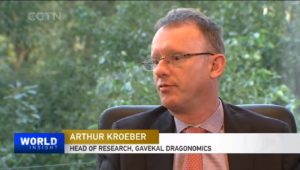
Concerns have been raised about the quality of the deals closed under the wide One Belt, One Road program. Economist Arthur Kroeber, author of China’s Economy: What Everyone Needs to Know, admits that some deals could be “wacky”, he tells the New York Times.“It certainly is a very capacious arena for opportunists, that’s for sure,” Mr. Kroeber added.
The New York Times:
As the economy shows signs of strain, Chinese officials are sounding caution about the program, taking a closer look at the financing of deals and the number of projects underway.
That hasn’t discouraged some companies.
“There are wacky deals that occur under the banner of Belt and Road because this is how every entrepreneur signals that they are in line with the leadership’s political objectives,” said Arthur Kroeber, managing director of Gavekal Dragonomics, an independent economic research firm.
“It certainly is a very capacious arena for opportunists, that’s for sure,” Mr. Kroeber added.
In addition to the Chinese-medicine spa in the Czech Republic, there are plans for Chinese cultural centers and theme parks in Hungary, Italy, the Philippines, Russia, Serbia and Vietnam. One construction firm used the Belt and Road plan to justify a deal to build an amusement park in an Indonesian complex that includes a Trump hotel and golf course.
Arthur Kroeber is a speaker at the China Speakers Bureau. Do you need him at your meeting or conference? Do get in touch or fill in our speakers’ request form.
Are you looking for more specialists on the One Belt, One Road program? Do check out this list.
